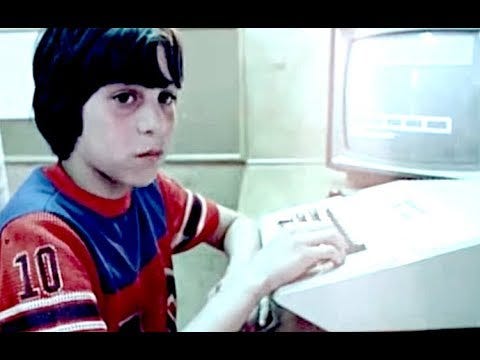If you became interested in computers in the late 70s / early 80s, you likely identify with the kid in the following video. His dad takes him to computer stores to mess around with computers because they don’t have a computer at home. Meanwhile, the dad stands there and talks about how everything the kid is doing is wizardry that no adult could ever understand.
What bugs me about this video is that the kid is sitting there doing something (probably writing a program to print “FART” to the screen repeatedly) and looking very much like he’s putting on a show of being a computer genius. Meanwhile the dad seems to be doting, and he certainly has good intentions.
It’s not dad’s fault that he doesn’t understand what the kid is doing. But, the kid is likely going to feel like he’s detached from the “real world” when he’s on the computer and he’s going to have a limited and warped sense of what computer programming is. If he were to stick with it, or come back to computer programming after some time, he’d figure it out. But his journey is going to be difficult because he started out with no context and no real guidance.
In the years since this video was made, it’s become much easier to use computers without learning to program. Today’s “computer genius kids” are more likely to be using software rather than writing it. But, many are still regarded as geniuses who speak a language (“digital native”) that adults can’t understand. Without context, many of these digital native kids believe it too.
I’m no child psychologist, but I don’t think that worshipping kids who learn something about computers (or any technical discipline…say, playing violin) is a good approach to encouraging them to follow through and be happy and not socially awkward. The kid in the video soon got “burned out” on computers, as he says in the recent follow-up video.
I’ve been thinking lately about how books and online resources for teaching kids to code are written, and how they might be written differently. It seems to me that if there's something kids want to learn, they'll do whatever it takes and they don't want to be stopped by the limitations of their teacher or books. In my own experience, both as a learner and a teacher, I’ve seen how this intensity can lead to problems such as boredom, misconceptions, and confusion if it’s not channeled.
I’m going to leave that there and return to it in a future email. Until then: were you a “computer genius”? How did that work out for you? Comment below!




Agreed, it's not a good thing to say, "You're so smart, you're a genius," etc. In the latest parenting books it's, "You figured that out!" Slight nuance, but then it doesn't set the kid up to tie their value to being "smart" or a "genius" and instead take pride in working for a solution.
My first computer was an Apple ][+ in 1982, I ran a successful BBS, moved from 300 baud through the years to 9600 baud(!), wrote a ton of my own games in Applesoft Basic, worked at a computer store after school each day, etc.
I went to Purdue for my CS degree and thought I was the bomb when I first arrived. I was snapped into hard reality and severely humbled -- and happily so -- that there were so many much-smarter people to learn so many cool things from. This remains why I love computers: there are so many people out there doing so many cool things that I know I'm not a "computer genius" and I do get to learn something new each and every day.
The programmers who have the attitude of, "Check out this cool thing I made," (or cool thing I discovered/learned) are the best to hang out with. The arrogant ones are still great to learn from, but you typically hang with them in smaller doses. I do love our community.
In 1969, I took a class to be a key punch operator. This is where most people stop listening to me because they have no idea what i am talking about. Then I explain that information for the computer was written on cards that had holes in them and the computer read the holes. As operators we memorized each hole and cell which represented a letter or number and some letter had 2 holes so you could tell which letter it was by the cell. If you were lucky the card was printed. But most of the it wasn't.
When we wrote a program on the cards, the stack of cards could be in the 100s. So, if the stack was dropped, it was he[[ to put them in order again. Then someone thought of taking a Magic Marker to make a line on the side of the stack going from the left top to the bottom right.
Awe, the good Ole days... 👍 in the 70s I was paid $10 an hour going to various companies to enter their needed info. I made the for cards that told how the following cards should be read, like name and addresses, or inventory stats. It was pretty much like a spreadsheet setting.
Who remembers these? Yes, I'm old. Lol